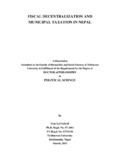Please use this identifier to cite or link to this item:
http://archive.nnl.gov.np:8080/handle/123456789/118| Title: | Fiscal decentralization and municipal taxation in Nepal |
| Authors: | Subedi, Som Lal |
| Keywords: | Fiscal decentralization--Nepal Taxation--Nepal |
| Issue Date: | 10-May-2018 |
| Abstract: | This study analyzed policies, institutional variables and their relationship with fiscal system with specific reference to fiscal decentralization and municipal taxation in Nepal. Specifically, this study reviewed fiscal decentralization practice in Nepal; evaluated government's resources allocation to municipalities; assessed the efforts made by the municipalities; analyzed revenue potentiality, institutional capacity, management practices and revenue mobilization; and made recommendations for effective taxation system in municipalities. It has analyzed fiscal decentralization on the ground of its four pillars namely, expenditure assignment, revenue assignment, fiscal transfer, and local borrowing. The study was conducted in 5 municipalities including Biratnagar, Kathmandu, Gorkha, Pokhara and Nepalganj with a total of 213 persons including 59 municipality officials and other stakeholders, 12 local politicians, and 45 policy makers belonging to state and non state sectors. The remaining 97 municipality officials were involved in focus group discussion. The municipalities were selected considering geographical, ecological, revenue volume, population size and types of municipality. Trend analysis of revenue and expenditure of all 58 municipalities for 12 years was done using descriptive statistics. Further specific analysis was done for 12 years in the sample municipalities using both primary and secondary information. It is found that the implementation of Local Self Governance Act (LSGA) 1999 is weak because of inadequate policy coordination, imperfect design of local bodies and ineffective management. The pillars of fiscal decentralization are not properly matched due to overlapping functions between central government and local bodies; duplication of functions among District Development Committee (DDC), Village Development Committee (VDC) and municipalities; unclear functions in LSGA; and unconsolidated task assignment to local bodies. Likewise, vertical and horizontal linkages and complementary and supplementary roles as well as relations among local bodies and the line agencies at the district level are weak. The central budgetary system is not decentralized to the tune of fiscal needs of the municipalities as it is largely ad hoc and incremental. It is further found that the municipal taxation and fiscal decentralization are directly linked with municipal service delivery. Similarly, urban governance has adopted limited fiscal decentralization and given tax bases to municipalities are too narrow. The responsible institutions like Ministry of Local Development (MOLD), Decentralization Implementation Monitoring Committee (DIMC) and Local Bodies Fiscal Commission (LBFC) do not have plan for devolution; nor do they have capacity strengthening comprehensive plan at the local level. The accountability mechanism is not functional and revenue plan is not prepared in the sample municipalities due to lack of elected representatives since B.S.2059 (2002 A.D.) The expenditure assignment between central agencies and local bodies and among the local bodies themselves is highly overlapped. Due to such overlap, the overall service delivery and the accountability of these service providers is weak. There is a big gap between service delivery provisioning and real service delivery in both central agencies and local bodies including municipalities. Despite various constraints, the efforts made by the municipalities are positive and the revenue collection trend is incremental. The introduction of formula- based grant system is considered as the main achievement which removed arbitrary basis of grant distribution to local bodies. The overarching conclusion is that the fiscal decentralization is the key to decentralization success and destination of governance reform. It is not properly designed and practiced in Nepal. The level of fiscal autonomy and its optimum utilization for people's welfare and service delivery depends on the level of good governance as well as social capital at the local level. There is no 'one size fits all' system of fiscal decentralization and municipal taxation. The four pillars of fiscal decentralization need to be considered as the basic elements of local government's reform in different layers including municipalities. The further studies on inter-governmental fiscal relations are needed to find out the needs and the gap of overall decentralization. |
| Description: | A dissertation submitted to the Faculty of Humanities and Social Sciences of Tribhuvan University in fulfillment of the requirement for the degree of Doctor of Philosophy in Political Science, 2013 |
| URI: | http://103.69.125.248:8080/xmlui/handle/123456789/118 |
| Appears in Collections: | 300 Social sciences |
Files in This Item:
| File | Description | Size | Format | |
|---|---|---|---|---|
| 131. Dr. Som Lal Subedi.pdf | 1.55 MB | Adobe PDF |  View/Open |
Items in DSpace are protected by copyright, with all rights reserved, unless otherwise indicated.